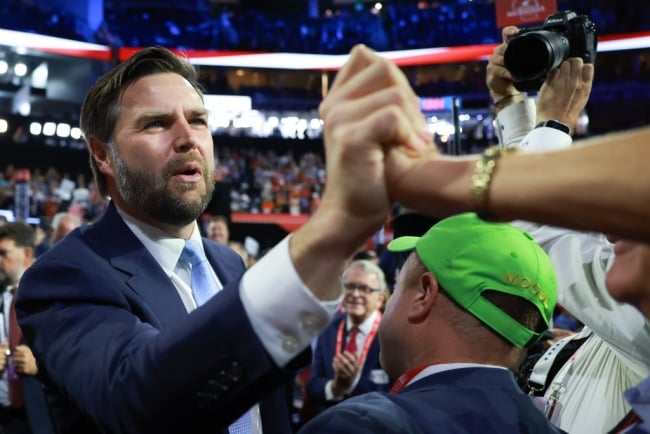You have /5 articles left.
Sign up for a free account or log in.

Senator J.D. Vance, a Republican from Ohio, was tapped Monday as former president Donald Trump’s running mate as he seeks a second term.
Joe Raedle/Getty Images
Donald Trump’s choice for vice president has called university professors “the enemy,” proposed legislation to restrict the consideration of race in admissions decisions and sought to crack down on the encampments that sprang up on college campuses this past spring.
Senator J.D. Vance, a 39-year-old Republican from Ohio and staunch Trump ally, wasn’t always a fierce critic of higher education or a defender of the former president. The author of the best-selling memoir Hillbilly Elegy, published in 2016, Vance has written and talked about how education is key to opportunity and how higher education helped to lift him out of poverty. Vance, a former Marine, graduated from Ohio State University and Yale University School of Law.
During his 2022 Senate campaign, his first run for office, Vance changed his tune on higher education, saying that universities are dedicated to “deceit and lies, not to the truth” in a 2021 speech at the National Conservatism Conference titled “The Universities are the Enemy.”
“So much of what we want to do in this movement and in this country, I think, are fundamentally dependent on going through a set of very hostile institutions, specifically the universities, which control the knowledge in our society, which control what we call truth and what we call falsity, that provides research that gives credibility to some of the most ridiculous ideas that exist in our country,” Vance told the assembled conservatives. “If any of us want to do the things that we want to do for our country, and for the people who live in it, we have to honestly and aggressively attack the universities in this country.”
Trump, a graduate of the University of Pennsylvania, praised Vance’s educational credentials in his Truth Social statement announcing the pick Monday afternoon, mentioning Yale three times.
“J.D. has had a very successful business career in Technology and Finance [sic], and now, during the Campaign, will be strongly focused on the people he fought so brilliantly for, the American Workers and Farmers in Pennsylvania, Michigan, Wisconsin, Ohio, Minnesota, and far beyond,” Trump wrote.
In the Senate, Vance built on his campaign rhetoric to establish himself as a populist foe of elite higher ed. He’s introduced legislation to ratchet up enforcement of federal laws that require disclosure of foreign donations to colleges and universities. He also sponsored a bill that would increase the excise tax on endowments’ net investment income from 1.4 percent to 35 percent for secular, private colleges and universities. The tax was necessary, he said, to rein in a university system that “has gone so insane.”
“Why is it that we allow these massive hedge funds pretending to be universities to enjoy lower tax rates than most of our citizens, people who are struggling to put food on the table and buy Christmas presents this season?” he said on the Senate floor in December. “It’s insane. It’s unfair. And I think we ought to fix it in this chamber now.”
Neither bill has moved forward in the Democratic-controlled Senate.
Following the Supreme Court’s decision in summer 2023 to end race-conscious admissions, Vance wrote to leaders of Ivy League institutions as well as Oberlin and Kenyon Colleges. Their initial responses to the ruling indicated an intention to defy it, he said, threatening a Senate investigation to uncover any noncompliance.
In a February interview with The European Conservative, Vance elaborated on his stance toward higher education and suggested farther-reaching actions. Those include taking away the tax-exempt status of private universities and going "after the university bureaucracy focused on diversity, equity and inclusion.” He touted Hungarian prime minister Viktor Orbán’s approach to dealing with “left-wing domination of universities,” which he said should be a model for the conservatives in the United States. That approach has involved seizing control of state universities.
Colleges, Vance said, “are enforcing dogma that is hostile to American conservatives, but that doesn’t mean that I think we can give up on the universities,” Vance said. “I think we actually have to recognize that they are the gateways to a lot of important professions and institutions in our country … We should be really aggressively reforming them in a way to where they’re much more open to conservative ideas.”
He doubled down on his support for Orbán’s methods in a May interview with Face the Nation, arguing that universities are “controlled by left-wing foundations,” not taxpayers.
“What I’m advocating for is for taxpayers to have a say in how their money is spent,” he told host Margaret Brennan. “Universities are part of a social contract in this country. They educate our children. They produce important intellectual property. They get a lot of money because of it. But if they’re not educating our children well, and they’re layering the next generation down in mountains of student debt, then they’re not meeting their end of the bargain. I think it’s totally reasonable to say there needs to be a political solution to that problem.”




